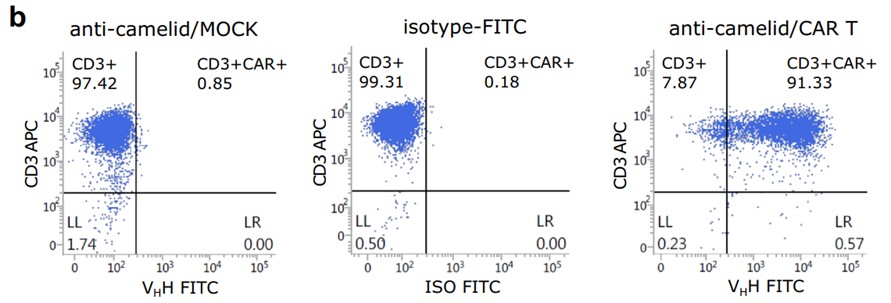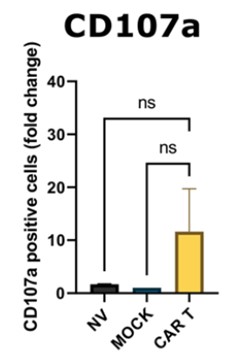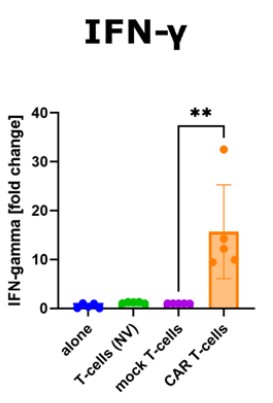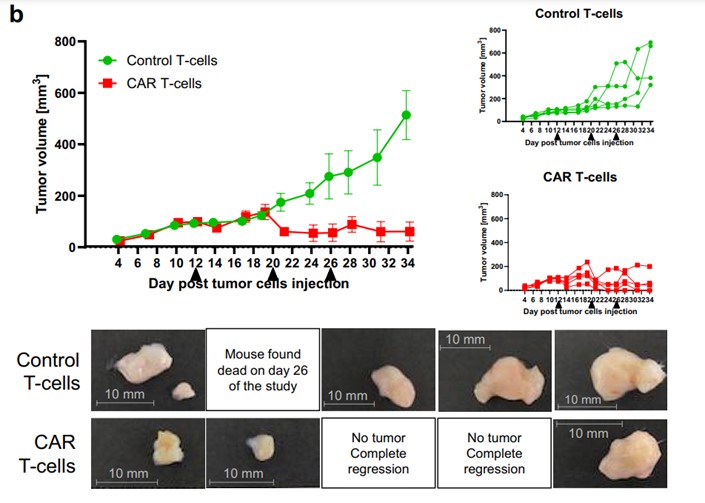All products and services are For Research Use Only and CANNOT be used in the treatment or diagnosis of disease.
We provide a series of CEACAM6 CART-related products and services to aid in the development of CEACAM6-targeted CAR-T therapy. Please feel free to contact us for more information on our CAR-T products and how they can benefit your research.
Carcinoembryonic antigen-related cell adhesion molecule 6 (CEACAM6), known as CD66c or NCA-90, is a multifunctional glycoprotein that belongs to the CEA family of cell adhesion molecules. CEACAM6 mediates homotypic binding to other members of the CEA family and heterotypic binding to integrin receptors. It plays several important roles in signal pathways by organizing tissue structure and regulating different signal transduction, and its abnormal expression leads to the development of human malignant tumors. Several studies validated CEACAM6 as a potential target, providing new sights into the development of efficient therapeutic strategies against many cancers.
Associated Disease
Flow cytometry is often used to detect CAR molecules in CART cells. In addition, there are some commonly used methods, such as qPCR, WB detection, and so on. Creative Biolabs has launched a variety of CAR detection reagents, including specific target detection reagents and universal detection reagents. At the same time, we also offer various sensitive testing methods to help customers quickly detect CAR expression.

Fig.1 Expression test of CEACAM6-CAR detected by flow cytometry analysis using anti-camelid VHH antibody.1
Phenotypic analysis of CART cells helps to further distinguish patterns that identify different phenotypic traits and provides important trait information to support further evaluation of defined traits. Creative Biolabs has developed comprehensive phenotype analysis testing, including proliferation test, cell subtype analysis, stimulation marker test, and degranulation marker test.

Fig.2 CD107 expression of CEACAM6-CAR T cells co-cultured with BxPC-3 target cells by flow cytometry analysis.1
Cytokine detection assay serves as an essential test to evaluate the activity of CAR-T cells co-cultures with target cells. We have developed intracellular cytokine analysis and extracellular cytokine release tests with a variety of approaches, such as multiplex cytokine tests, and intracellular cytokine tests by FACS.

Fig.3 Cytokine production of anti-CEACAM6 CAR-T cells co-cultured with BxPC-3 target cells.1
The cytotoxicity of CAR-T cells against target-specific tumor cells can be evaluated by using a variety of different methods, such as flow staining, real-time cell analysis (RTCA), LDH-based tests, etc.

Fig.4 In vitro cytotoxicity of CEACAM6-CAR T-cells against CEACAM6 overexpressed MDA-MB-231 cell line detected by real-time cell analysis assay (RTCA). (The orange line represents the CEACAM6-CAR T-cells group; the green line represents the control mock T-cells group; the purple line represents the untransduced T-cells group; the blue line represents the tumor cells without T-cells group; the red line represents the positive control group: tumor cells treated with 0.1% Triton X-100).1
Leverage by years of experience in the CART fields, we provide high-quality one-stop CART development services. In addition to the above in vitro experiments, we also provide a series of in vivo experimental services, including tumor model construction, in vivo experimental protocol optimization, in vivo efficacy analysis services, etc.

Fig.5 In vivo anti-tumor activity of CEACAM6-CAR T-cells in the BxPC-3 xenograft mouse models. BxPC-3 xenograft mouse models were treated with CEACAM6-CAR T-cells on days 12, 20 and 26 after BxPC-3 cell injections. The upper panel showed mean tumor sizes, and bottom panel showed the tumors photos at the end of the studies.1
Reference
 Loading...
Loading...
| CAT | Product Name | Target Species | Antibody Clone | Antibody Host | Receptor Construction | Vector Type | Targeting Cell Type | CAR Vector Type | Inquiry & Datasheet |
| CAR-YF038 | Anti-CEACAM6 (NEO-Human 201) h(4-1BB-CD3ζ) CAR, pCDCAR1 | Human | NEO-Human 201 | Mouse | scFv-4-1BB-CD3ζ | Lentiviral vector | NK Cell | ||
| CAR-YF039 | Anti-CEACAM6 (NEO-Human 201) h(CD28-CD3ζ) CAR, pCDCAR1 | Human | NEO-Human 201 | Mouse | scFv-CD28-CD3ζ | Lentiviral vector | NK Cell | ||
| CAR-ZP110 | Anti-CEACAM6 (NEO-Human 201) h(41BB-CD3ζ) CAR, pCDCAR1 | Human | NEO-Human 201 | Mouse | scFv-4-1BB-CD3ζ | Lentiviral vector | NK cell | ||
| CAR-ZP2034 | Anti-CEACAM6 (hMN-15) h(CD28-CD3ζ) CAR, pCDCAR1 | Human | Human | scFv-CD28-CD3ζ | Lentiviral vector | T cell | |||
| CAR-ZP2035 | Anti-CEACAM6 (hMN-15) h(41BB-CD3ζ) CAR, pCDCAR1 | Human | Human | scFv-41BB-CD3ζ | Lentiviral vector | T cell | |||
| CAR-ZP2036 | Anti-CEACAM6 (NEO-201) h(CD28-CD3ζ) CAR, pCDCAR1 | Human | NEO-201 | Human | scFv-CD28-CD3ζ | Lentiviral vector | T cell | ||
| CAR-ZP2037 | Anti-CEACAM6 (NEO-201) h(41BB-CD3ζ) CAR, pCDCAR1 | Human | NEO-201 | Human | scFv-41BB-CD3ζ | Lentiviral vector | T cell | ||
| CAR-ZP2038 | Anti-CEACAM6 (2A3) h(CD28-CD3ζ) CAR, pCDCAR1 | Human | 2A3 | Llama | scFv-CD28-CD3ζ | Lentiviral vector | T cell | ||
| CAR-ZP2039 | Anti-CEACAM6 (2A3) h(41BB-CD3ζ) CAR, pCDCAR1 | Human | 2A3 | Llama | scFv-41BB-CD3ζ | Lentiviral vector | T cell | ||
| CAR-ZP2040 | Anti-CEACAM6 (13-1) h(CD28-CD3ζ) CAR, pCDCAR1 | Human | 13-1 | Mouse | scFv-CD28-CD3ζ | Lentiviral vector | T cell | ||
| CAR-ZP2041 | Anti-CEACAM6 (13-1) h(41BB-CD3ζ) CAR, pCDCAR1 | Human | 13-1 | Mouse | scFv-41BB-CD3ζ | Lentiviral vector | T cell | ||
| CAR-ZP2042 | Anti-CEACAM6 (8F5) h(CD28-CD3ζ) CAR, pCDCAR1 | Human | 8F5 | Mouse | scFv-CD28-CD3ζ | Lentiviral vector | T cell | ||
| CAR-ZP2069 | Anti-CEACAM6 (SPM506) h(41BB-CD3ζ) CAR, pCDCAR1 | Human, Monkey | SPM506 | Mouse | scFv-41BB-CD3ζ | Lentiviral vector | T cell | ||
| CAR-ZP2070 | Anti-CEACAM6 (ML02C001) h(CD28-CD3ζ) CAR, pCDCAR1 | Human | ML02C001 | Mouse | scFv-CD28-CD3ζ | Lentiviral vector | T cell | ||
| CAR-ZP2071 | Anti-CEACAM6 (ML02C001) h(41BB-CD3ζ) CAR, pCDCAR1 | Human | ML02C001 | Mouse | scFv-41BB-CD3ζ | Lentiviral vector | T cell | ||
| CAR-ZP2072 | Anti-CEACAM6 (SPM584) h(CD28-CD3ζ) CAR, pCDCAR1 | Human | SPM584 | Mouse | scFv-CD28-CD3ζ | Lentiviral vector | T cell | ||
| CAR-ZP2073 | Anti-CEACAM6 (SPM584) h(41BB-CD3ζ) CAR, pCDCAR1 | Human | SPM584 | Mouse | scFv-41BB-CD3ζ | Lentiviral vector | T cell | ||
| CAR-ZP2074 | Anti-CEACAM6 (PARLAM4) h(CD28-CD3ζ) CAR, pCDCAR1 | Human | PARLAM4 | Mouse | scFv-CD28-CD3ζ | Lentiviral vector | T cell | ||
| CAR-ZP2075 | Anti-CEACAM6 (PARLAM4) h(41BB-CD3ζ) CAR, pCDCAR1 | Human | PARLAM4 | Mouse | scFv-41BB-CD3ζ | Lentiviral vector | T cell | ||
| CAR-ZP2076 | Anti-CEACAM6 (xp18) h(CD28-CD3ζ) CAR, pCDCAR1 | Human | xp18 | Mouse | scFv-CD28-CD3ζ | Lentiviral vector | T cell |
 NEWSLETTER
NEWSLETTER
The latest newsletter to introduce the latest breaking information, our site updates, field and other scientific news, important events, and insights from industry leaders
LEARN MORE NEWSLETTER NEW SOLUTION
NEW SOLUTION
CellRapeutics™ In Vivo Cell Engineering: One-stop in vivo T/B/NK cell and macrophage engineering services covering vectors construction to function verification.
LEARN MORE SOLUTION NOVEL TECHNOLOGY
NOVEL TECHNOLOGY
Silence™ CAR-T Cell: A novel platform to enhance CAR-T cell immunotherapy by combining RNAi technology to suppress genes that may impede CAR functionality.
LEARN MORE NOVEL TECHNOLOGY NEW SOLUTION
NEW SOLUTION
Canine CAR-T Therapy Development: From early target discovery, CAR design and construction, cell culture, and transfection, to in vitro and in vivo function validation.
LEARN MORE SOLUTION